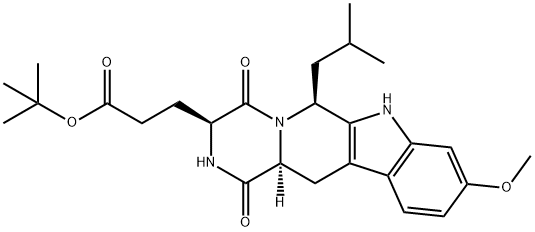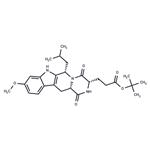Breast cancer resistance protein (BCRP) is an ATP-binding cassette protein known also as ABCG2. While it normally functions as a high-capacity urate exporter in the renal system, it also acts as a xenobiotic transporter and contributes to multidrug resistance (e.g., to mitoxantrone) in certain types of cancer. BCRP is abundant at the intestinal epithelium and blood-brain barrier, potentially restricting the distribution of certain drugs. Ko 143 is a potent and selective inhibitor of BCRP, preventing the export of mitoxantrone and topotecan in breast cancer cell lines (EC50s = 23 and 26 nM, respectively). It is much less effective at the transporters P-glycoprotein and multidrug resistance-associated protein 1, MRP1. Ko 143 is effective in vivo in mice.
A potent BCRP (breast cancer resistance protein) inhibitor
Ko143 hydrate has been used:
- to determine the role of ATP-binding cassette sub-family G member 2 (ABCG2), human embryonic kidney (HEK)-C1 and HEK-ABCG2 in tumor microenvironment
- to inhibit ABCG2 for sphere formation assay
- in calcein-AM efflux inhibition to monitor multidrug resistance protein (MRP)-function in kidney
- for cell viability assay
ChEBI: LSM-6260 is a member of beta-carbolines and a tert-butyl ester.
Potent and selective breast cancer resistance protein multidrug transporter (BCRP) inhibitor (EC 90 = 26 nM). Displays > 200-fold selectivity over P-gp and MRP-1 transporters. Increases intracellular drug accumulation and reverses BCRP-mediated multidrug resistance.
Ko143 has been used as a positive control inhibitor on functions of breast cancer resistance protein (BCRP) using a BCRP prototypical substrate mitoxantrone. BCRP, an ABCG2 transporter, plays an important role in disposition of many drugs and environmental toxins. Ko143 displays > 200-fold selectivity over P-gp and MRP-1 transporters and thus is more specific than other known BCRP inhibitors such as fumitremorgin C and GF120918. It increases intracellular drug accumulation and reverses BCRP-mediated multidrug resistance. It blocks topotecan and ABZSO transport in a concentration-dependent manner.
1) Allen et al. (2002), Potent and specific inhibition of breast cancer resistance protein multidrug transporter in vitro and in mouse intestine by a novel analogue of fumitremorgin C; Mol. Cancer Ther., 1 417
2) Weidner et al. (2015), The Inhibitor Ko143 Is Not Specific for ABCG2; J. Pharmacol. Exp. Ther., 354 384
3) Palasuberniam et al. (2015), ABCG2 transporter inhibitor restores the sensitivity of triple negative breast cancer cells to aminolevulinic acid-mediated photodynamic therapy; Sci. Rep., 5 13298
4) Moreno-Sanz et al. (2011), The ABC membrane transporter ABCG2 prevents access of FAAH inhibitor URB937 to the central nervous system; Pharmacol. Res., 64 359
5) Sabnis et al. (2017),?The Efflux Transporter ABCG2 Maintains Prostate Stem Cells;? Mol. Cancer Res., 15 128


